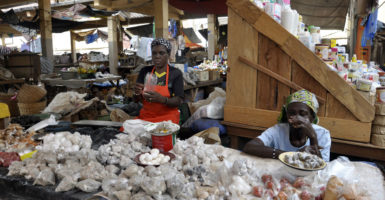The Heritage Foundation has taken its message of economic freedom on the road.One stop was Cotonou, the capital of Benin—a small country of about 9 million next door to Nigeria in West Africa.
It was there that we met Glwadys Tawema, a young entrepreneur who is struggling to keep her small business profitable in spite of costly, largely unnecessary government regulations.
“Madame Glwadys,” as she is affectionately known, has a small factory in Cotonou where she manufactures shea butter by extracting it from the nut of the African shea tree. Shea butter is an important ingredient in the manufacturing of a wide variety of food products, including chocolate. It is also in high demand as a cosmetic and skin moisturizer in European and American markets.
The trouble is that governments in Benin, and elsewhere in West Africa, have import restrictions and other unnecessary regulations that make it difficult for Glwadys to operate her business efficiently, and which add greatly to her costs of production.
The government of Benin needs to redouble its efforts to fight corruption, over-regulation, and other inefficient practices.
For example, Glwadys cannot import the plastic containers she needs to bulk-ship her product to overseas distributors. She has to drive hundreds of miles over bad roads to Ghana, two countries farther west, to acquire the containers.
Once she gets to Ghana, she confronts yet another set of business-hindering government rules.
For reasons she says are never explained, she is required to pay a “deposit” amounting to thousands of dollars that must come out of her company’s very tight production budget. On top of that, other Ghanaian restrictions mean that she is only able to ship a limited number of the containers, even if they are in her own car, increasing the pressure on her company’s cash flow. That means Glwadys must make more trips to buy the total number of containers she needs, taking time away from her business and increasing costs.
Along the way, she has to fend off demands for bribes from low-level government, customs, and police officials at nearly every stop.
The Heritage Foundation’s 2016 Index of Economic Freedom reports that Benin’s entrepreneurial environment has gradually benefited from a relatively stable political and macroeconomic situation. That is good news for people like Glwadys.
The bad news is that Benin continues to lag in competitiveness—as Glwadys knows all too well—and the government is all too often a hindrance rather than a help to entrepreneurs who could generate the broad-based economic activity that is critical to reducing poverty.
The poor quality of physical and legal infrastructure, exacerbated by the government’s inefficiency in delivering public goods, are serious impediments to long-term economic development.
The government of Benin needs to redouble its efforts to fight corruption, over-regulation, and other inefficient practices. If government just gets out of the way, more people in Benin like Glwadys will step forward to lift themselves out of poverty.



























